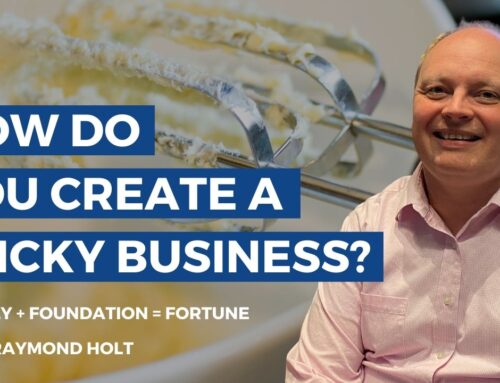At Agnentis, we spend a lot of time speaking and writing about the power of having a vision and sticking to it. But try as we might, we’d struggle to ever communicate a message as strong as the one being transmitted by Swedish professional football club Östersunds FK. Their story exemplifies so many of our messages to business leaders around values and principles, we’re best off just telling it.
The club came to prominence in February this year after being drawn against English club Arsenal in the Europa League. Founded in 1996, Östersunds FK have spent most of their existence in the third and fourth tiers of Swedish football to crowds of less than 1,000 people. But, that was before British manager Graham Potter arrived at the club.
Since Potter took over as manager in 2011, Östersunds FK have enjoyed a run of three promotions, which means they now compete in Allsvenskan, Swedish football’s top tier, alongside heavyweights Gothenburg and Malmo. They qualified for the 2017-18 Europa League after winning the main Swedish football cup. Potter continues to defy expectations, reaching the last 32 of the Europa League, before knocked out by Arsenal. But Potter and his team will be back on the European football scene before too long, that looks assured.
Potter has done an incredible job transforming Östersunds FK from a team nobody had heard of to one that’s competing on the European stage. Just how has he done it?
Alignment of vision and values
Östersunds FK’s path to European competition was first envisioned by the club’s chairman Daniel Kindberg. After taking over the club in 2007, he set out to convert it into one of Sweden’s top teams – but things got worse before they got better.
“As you know in 2010 we struggled badly and we were relegated, which wasn’t good,” Kindberg told BBC Sport. “I said I couldn’t be involved in this and I left. To make a long story short, the players said: ‘If you don’t come back, we quit.’ So I did something I don’t do, I took a decision on emotion and I came back.
“We sat down and talked – six, seven people – put out the emotions and asked ourselves why. Why do we do this? Why are we in the club? We work for free, why do we put in all this effort? What do we want to see? What do we want with our ambitions in football? What is everything about?
“Through that process, we created our values and ambition of where we should be – to be in the elite part of football and play European competitive football in our stadium. People thought we were lunatics. Maybe they were right.”
During those discussions, it was clear that if the vision was to become a reality, they’d need to find a manager who could translate the values and ambition onto the pitch.
Taking risks
Potter was identified as the man to execute the club’s vision. But it was something of a two-way risk: Kindberg was hiring someone with zero experience as a professional coach, while Potter was to have to move his family to the cold depths of Sweden.
“My wife had built up a business for 10 years and we’d just had our first child,” Potter explained. “So in that way it was a big move, it was her leaving her life. It’s not as if we were coming to Monte Carlo or a big football place – it was the fourth tier of Swedish football. It was a gamble.
“It was January/February. It’s -25C outside so there’s not so much you can do, getting to know people. Östersund had just been relegated so it wasn’t in a positive place. People didn’t believe in the club and didn’t really like the club, if I’m honest.
“My wife went to the local nursery and she was asked: ‘What are you doing here?’
‘My husband’s got a job.’
‘Great, what is it?’
‘Football coach.’
‘Who for?’
‘Östersund.’
‘I’d go home if I were you.’”
Creating a comfortable environment
As well as having to convince his wife to move to Ostersund, Potter must make a similar case to international players. He acknowledges that it takes a “certain type of person” to move to Östersund, so a lot of effort is expended on making it as appealing as possible.
“We spend a lot of time and resources on making players feel comfortable in this environment,” he told The Set Pieces website. “After all, players play football for a couple of hours a day and are human beings the rest of the time.”
He added: “From a football and person perspective, it’s about learning, trying to improve and making a difference in this small part of the world. If players are open-minded enough, it’s a really good opportunity for them. When we sign players, we’re looking for an attitude that says, ‘I want to improve every day’.”
Building an identity
Kindberg and Potter understand the importance of creating an identity and culture for the club. The culture at Östersunds FK is not based on your typical ‘football is everything’ philosophy. In fact, it recognises that there is more to footballers than just their profession.
“We’re trying to grow individuals holistically as well as from a football perspective,” Potter explains. They have developed a ‘culture academy’ where players sing, dance and act in front of an audience in an attempt to boost their performance ability. This has included staging a rock concert and a performance of Swan Lake.
Potter admits the activities are “to help us win football matches fundamentally”, but stressed that they have knock-on effects in terms of self-awareness, motivation and empathy.
“You start to find out about people in a different way. You can see who is more comfortable in uncomfortable situations, how they respond to that and how you can work with them and help them develop.”
Family-first approach
Despite his obvious dedication to the Östersunds project, Potter proudly declares that he puts his family before ‘business’.
“A lot has happened here. Two kids have been born here, my eldest is at school. Regardless of me and my wife, we have to have a family feel, we have to look after each other. We’re a tight-knit group because we’re here in Östersund – the next town is two and a half hours away. You’re a footballer for a couple of hours a day – then you’ve got to be somebody’s husband, somebody’s friend.”
The next milestone for Östersunds FK is to win the Allsvenskan and qualify for the Champions League. You wouldn’t put it past Potter and Kindberg. They’ve built something that we all can all be inspired by.






